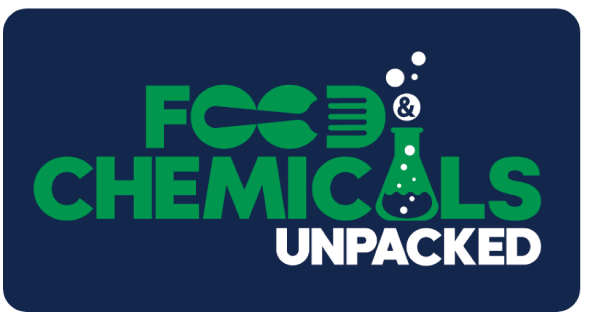Food & Chemicals Unpacked Podcast

| + More |
Food & Chemicals Unpacked is your go-to podcast for hot topics in the food and chemical industry.
Join our hosts, Keller and Heckman Partners Mark Thompson and Katie Skaggs, as they provide a bird’s eye view of the emerging legal and scientific issues surrounding the food, chemical, packaging, and related consumer product industries in an easily digestible and accessible format.
Food & Chemicals Unpacked provides clear and concise updates on legislative developments, new regulations, and other non-governmental initiatives that impact these industries. Each episode presents critical information on these topics along with supporting resources from Keller and Heckman’s websites, including packaginglaw.com, The Daily Intake (our food blog), and The Continuum of Risk (our tobacco and e-vapor blog).
If you have any questions related to the Food & Chemicals Unpacked podcast, please reach out to podcast@khlaw.com.
Episodes
| 20. | Year in Review: Fare Thee Well 2025 What a long, strange trip it’s been for the industry this last year. In this episode, hosts Mark and Katie take a high-level look at the regulatory shifts that have shaped food and packaging in the last year, from FDA leadership changes and evolving approaches to food additives, GRAS, and ultra-processed foods, to rising state-level action on EPR, PFAS, and color additives. We also cover major global developments, including the EU’s new Packaging and Packaging Waste Regulation and key updates to China’s food contact standards. Join us as we take a Grateful look back on the milestones of a transformative year and what Weir looking out for on the horizon. | Please see our show notes (here) for further information on the topics discussed and online articles with additional details on these issues. |
| 19. | Packaging as a Consumer Product - When It's Not Just What's Inside That Counts In this episode, Partner Sheila Millar, Counsel Antonia Stamenova-Dancheva, and Associate Anushka Stein join our hosts to break down the complex world of packaging regulations for consumer products. From identifying which types of packaging fall under federal scrutiny to preparing for major upcoming changes like CPSC eFiling in 2026, we dive into essentials for producers and importers. We explore the specific laws that govern safety, including the Consumer Product Safety Improvement Act (CPSIA) and the Poison Prevention Packaging Act (PPPA), and analyze real-world recall examples involving physical hazards, lead limits, and child-resistant closures. | Please see our show notes (here) for further information on the topics discussed and online articles with additional details on these issues. |
| 18. | Ultra-Processed Foods (UPF): What Are We Even Talking About? In this episode of Food and Chemicals Unpacked, we’re joined by Dave Fusaro, Editor in Chief of Food Processing magazine, to unpack the growing debate over ultra-processed foods (UPFs). We discuss Mark Thompson's article, "Ultraprocessed Foods: What Are We Even Talking About?" along with recent regulatory and legislative developments, including the FDA’s request for information on UPFs, state-level actions such as California’s AB 1264, and ongoing efforts to define what “ultra-processed” really means. | Please see our show notes (here) for further information on the topics discussed and online articles with additional details on these issues. |
| 17. | EPR You Keeping Up with Extended Producer Responsibility? In this episode of Food & Chemicals Unpacked, we revisit Extended Producer Responsibility (EPR) for packaging, now rapidly advancing with deadlines approaching. Keller and Heckman Partner Rachel Bond returns to share updates on state implementation, reporting requirements, a legal challenge, and the latest legislative developments, including new study bills and growing momentum across the U.S. | Please see our show notes (here) for further information on the topics discussed and online articles with additional details on these issues. |
| 16. | Color Me Bad: The Push to Remove Color Additives from Food In this episode, Keller and Heckman LLP Partner Eve Pelonis joins us to dive deep into the colorful world of color additives for food, drugs, and cosmetics, clearing up common misconceptions. We touch on important issues, including whether the GRAS exemption is applicable to color additives, and the recent attention on synthetic color additives by Secretary Robert F. Kennedy Jr. and the new administration's push for natural alternatives. | Please see our show notes (here) for further information on the topics discussed and online articles with additional details on these issues. |
| 15. | FDA Can’t Stop, Won’t Stop – Navigating the New Administration In this episode of Food & Chemicals Unpacked, we dive into the current adjustments experienced at the U.S. Food and Drug Administration (FDA) so far under the Trump administration. Keller and Heckman Partner George Misko joins us to discuss the future of food safety regulations, including the downsizing of HHS under Secretary Robert F. Kennedy Jr., potential changes to the GRAS process, and FDA’s ongoing post-market review program. We also discuss Keller and Heckman’s Paper Packaging Law Seminar coming up in May 2025. | Please see our show notes (here) for further information on the topics discussed and online articles with additional details on these issues. |
| 14. | Making-up for Lost Time: FDA’s Increased Oversight of Cosmetics In this episode, we are joined by guest speakers, Partners Cynthia Lieberman and Rick Stearns, who dive into the recent evolution of FDA's cosmetics regulations. They explore the Modernization of Cosmetics Regulation Act (MOCRA), including new requirements relating to adverse event reporting, Good Manufacturing Practices, and other topics. The discussion also provides insights on how cosmetics and personal care product manufacturers and their suppliers can ensure that finished products (makeup, soaps, sunscreen, shampoo, etc.) maintain compliance with MOCRA and other current legal obligations in the United States. | Please see our show notes (here) for further information on the topics discussed and online articles with additional details on these issues. |
| 13. | Let's Pack It Up - 2024 Packaging Year in Review In this episode, we reflect on key legal, scientific, and industry developments from 2024 that impact packaging and some insights on what to expect and prepare for in the upcoming year across the food and chemical industry. | |
| 12. | Trash Talk: The EU’s Packaging and Packaging Waste Regulation (PPWR) | Please see our show notes (here) for further information on the topics discussed and online articles with additional details on these issues. |
| 11. | Economic Adulteration: Secrets in the Sauce In this episode, we cover "economic adulteration," which is intentionally changing a food product's composition for an economic motive (e.g., removing or substituting a valuable ingredient or part of a food). This is often referred to as "food fraud." Keller and Heckman Partner Tony Pavel joins us to provide an overview of the history of economic adulteration in the U.S. and more globally, and how this phenomenon has contributed to the evolution of food safety laws. We cover a few different examples of economically adulterated food products, which shed light on the ongoing challenges that regulators, food safety experts, and supply chain managers face in addressing this issue. We also discuss what companies should be doing to mitigate risk. | Please see our show notes (here) for further information on the topics discussed and online articles with additional details on these issues. |
| 10. | Much Ado About TiO2 This episode provides an update on recent activity involving the use of food additive titanium dioxide (TiO2). It includes a brief background on the use of TiO2 followed by the recent inquiries into the safety of TiO2 in France and Europe, and a recent statement by FDA confirming the safety of the food additive. Dr. Ivan Boyer, a staff toxicologist at Keller and Heckman, shares his insights on the scientific data and the deficiencies in the EFSA assessment that underpinned the recent European ban on TiO2 as a food additive. | Please see our show notes (here) for further information on the topics discussed and online articles with additional details on these issues. |
| 9. | Prop Bets: Weighing the Stakes with Proposition 65 This episode explores California’s Safe Drinking Water and Toxic Enforcement Act of 1986, also known as Proposition 65. Partner Sophie Castillo, an attorney from Keller and Heckman’s California Proposition 65 and Litigation practices, shares her insights on complying with Proposition 65. Sophie provides background on the law, the significance of a Proposition 65 warning, preemption and other legal challenges, as well as Office of Environmental Health Hazard Assessments (OEHHA) and bounty hunter activity. Additionally, the episode dives into trends in the chemicals and product categories targeted by bounty hunters. | Please see our show notes (here) for further information on the topics discussed and online articles with additional details on these issues. |
| 8. | The Notorious NAD: Challenge Accepted? The 8th episode of Food & Chemicals Unpacked dives into the inner workings of the National Advertising Division (NAD), the advertising industry’s self-regulatory mini court. Keller and Heckman attorneys Katie Bond and Samuel (Sam) Butler, both from our Advertising and Promotion practice, join us to provide an overview of all things NAD. We cover its origin, the structure of NAD proceedings, the interaction between the NAD and the Federal Trade Commission (FTC), what types of companies participate in NAD challenges, the appeals process, and more. The episode highlights the findings of a new analysis by Katie and Sam on changing outcomes at the NAD over the past few decades. | Please see our show notes (here) for further information on the topics discussed and online articles with additional details on these issues. |
7. | Pit Stop at Chevron: Will We See a Difference in Deference? In this episode, we take a more traditional legal focus and discuss potential changes to a cornerstone of federal administrative law called Chevron Deference. This standard has long governed how much deference federal courts give to decisions made by agencies, such as FDA and EPA. It is based on a 1984 case, Chevron v. Natural Resources Defense Council, that the Supreme Court recently agreed to reconsider in an upcoming case this fall. Keller and Heckman Partners Eric Gotting and David Joy join us to discuss potential implications for FDA and other agencies if the Supreme Court decides to vacate the Chevron decision or limits its application, as well as legislative developments such as the Food and Drug Omnibus Reform Act of 2022. They use recent federal court decisions in Genus Medical Technologies LLC. v. U.S. FDA and Catalyst Pharmaceuticals, Inc. v. Becerra to illustrate how Chevron Deference works and what changes may be in store for FDA and the regulated community. | Please see our show notes (here) for further information on the topics discussed and online articles with additional details on these issues. |
| 6. | Laying Claim: FTC’s Green Guides This episode offers a roundtable discussion on the regulatory landscape surrounding “green claims” in the United States with Keller and Heckman partners Sheila Millar and JC Walker. This detailed conversation touches on numerous advertising claims of interest to brand owners that are currently under consideration by the Federal Trade Commission (FTC) in an effort to update its “Green Guides.” The FTC is currently accepting comments on key claims addressed in the Guides (e.g., “recyclable,” “recycled content,” “degradable,” “compostable,” and “carbon offset”), which are commonly leveraged by consumer brands. Sheila and JC also address the impacts that evolving state legislation and court rulings have on the use of green claims within the market. |
Please see our show notes (here) for further information on the topics discussed and online articles with additional details on these issues. |
| 5. | Extended Producer Responsibility: EPR You Ready? The topic of this episode is Extended Producer Responsibility (EPR) programs for packaging materials, which have begun to proliferate in the U.S. Four states have now implemented EPR programs, others have proposed legislation, and more states are expected to follow suit in the years to come. Keller and Heckman Partner Rachel Bond joins our hosts to discuss EPR and related sustainability issues. Rachel provides insight into regulations, requirements, and exemptions in place for current EPR programs. Associate Caleb Holland also reports on EPR legislation, both at the federal and state level. | Please see our show notes (here) for further information on the topics discussed and online articles with additional details on these issues. |
| 4. | Blowing Smoke: FDA’s Evolving Regulation of Tobacco and Nicotine Products This episode details the regulatory landscape for tobacco products and reports on current trends in the industry. Our team shares its knowledge of the process for obtaining authorization to market new tobacco products in the U.S. We also provide the inside scoop on industry-shaping litigation that Keller and Heckman has led. Finally, the episode discusses recent changes at FDA’s Center for Tobacco Products and how the changes might impact industry. | Please see our show notes (here) for further information on the topics discussed and online articles with additional details on these issues. |
3.
| Off the Shelf: An Inside Look at the Infant Formula Shortage In this episode, we discuss the current shortage of infant formula in the U.S. with Food and Drug Partner Rick Stearns. In February 2022, a recall of infant formula produced at a single U.S. facility contributed to a major shortage in the infant formula market. To date, FDA continues its efforts to mitigate the effects of this shortage. As the disruptions to infant formula supply now show signs of easing, we look into the underlying causes, trajectory, and FDA intervention. The episode covers FDA oversight of infant formula manufacturing, aimed at ensuring that consumers are presented with safe and quality products that provide suitable nutritional content. Our team also discusses the lasting impact these events may have on the market. | Please see our show notes (here) for further information on the topics discussed and online articles with additional details on these issues. |
| 2. | Chasing Arrows – The EU’s Plastic Recycling Scheme Our second episode discusses an important development in Europe – a revision to the European Union’s rules on the use of recycled plastics in food packaging. This new law completely revamps how plastics recycling is regulated in Europe and will impact the entire supply chain, from recyclers to packaging manufacturers, and even everyday consumers. Our team also walks through some recent news on PFAS, some FDA pronouncements on genome-edited beef cattle and guacamole, as well as a major action by the sugar industry. | Please see our show notes (here) for further information on the topics discussed and online articles with additional details on these issues. |
| 1. | PFAS and Furious Welcome to the first episode of Food & Chemicals Unpacked! Today’s episode focuses on the regulation of PFAS in food packaging applications. This incredibly important issue affects a huge number of products in various markets. We provide an overview of these chemistries and summarize developments in the United States at both the Federal and State level on PFAS regulation. Additionally, our team discusses some of the recent trade press that impacts food, e-cigarettes, and the chemical industry. | Please see our show notes (here) for further information on the topics discussed and online articles with additional details on these issues. |
| Welcome to Food & Chemicals Unpacked An introduction to our a la carte podcast covering all things relating to the food and chemical industries. Food & Chemicals Unpacked will help you dig into the legal requirements and science surrounding food, packaging, chemicals, tobacco products, and much more. Learn how these products are regulated and insights on current news and developments in this space. |
About the Hosts

| Mark Thompson counsels companies and trade associations on global compliance requirements applicable to finished foods, food additives, food packaging materials, cosmetics, commercial chemicals, and associated labeling in Asia, the Americas, and the European Union. He also advises clients on the regulation of drugs and genetically modified organisms (GMOs) in Asia. Mark was based in the firm’s Shanghai Representative office from 2009 through 2016. During that time, he gained extensive experience and perspective on the regulatory scheme in China and throughout Asia. View Mark's full bio. |

| Katie Skaggs is an expert in the regulation of food contact materials in a host of jurisdictions including the U.S., EU, South America (particularly the MERCOSUR bloc), Canada, China, eastern Asia, India, the Middle East (GCC), Australia, and New Zealand. Katie assists companies in bringing to market new food contact materials, such as plastics, biopolymers, paper, adhesives, coatings, recycled materials, and components of these materials (antioxidants, colorants, and other additives and processing aids), through submissions to government agencies in the U.S. and abroad. She manages post-market issues for food contact substances, such as recalls and accidental adulterations, and advises on environmental claims for food contact materials, as well as compliance with state laws like California's Proposition 65. View Katie's full bio. |